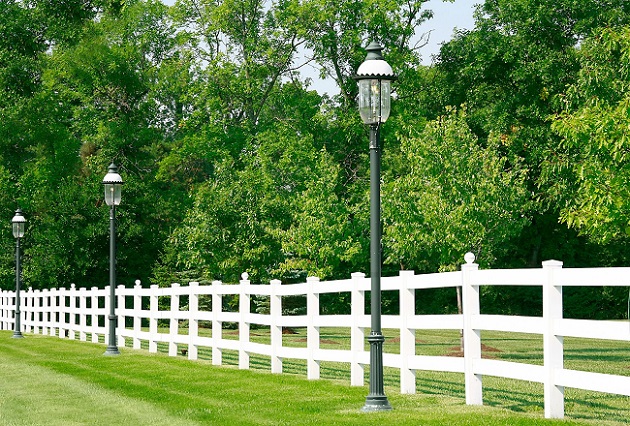 Fence installation has always been the preferred way of enhancing a property’s security and privacy. Whether you want to prevent children from accidentally running towards a busy main road, or keep game and livestock within their designated areas, you can customize a fence to meet your needs.
Fence installation has always been the preferred way of enhancing a property’s security and privacy. Whether you want to prevent children from accidentally running towards a busy main road, or keep game and livestock within their designated areas, you can customize a fence to meet your needs.
Before you get in touch with a professional deer fence contractor and inquire about deer fence installation, it’s best to be familiar with the various fencing materials available in the market so you can make an informed decision.
Barbed Wire
Barbed wire fences are strictly functional, and are typically installed to keep livestock in, and predators out of the property. The standard perimeter barbed wire fence has at least five strands of barbed wire strung between metal t-posts. Heavier wood or steel posts are installed at the corners to support the tension of the stretched wire. Keep in mind that barbed wire fences are prohibited in most communities. It’s best to check local regulations first if you want to go with this material.
Re-stretch barbed wire strands periodically because they tend to sag due to livestock leaning on them.
Chain Link
While chain link fences might get a low rating on privacy, these offer affordable and adequate security for children and pets. Chain link fencing is among the least expensive in the market, which makes it the preferred choice in vast rural areas where the amount of fencing required makes other options cost-prohibitive. Moreover, it’s easy to install which saves a lot of money.
Chain links can corrode, particularly at the junctions where the links meet. Increase their life span and upgrade to vinyl coated chain links. It looks better, too.
Masonry
Masonry materials include concrete, stucco, brick, block, and stone. Masonry fences require a structural base below the frost line to support their weight. Masonry fences have a classic, stately appearance but are expensive and require professional installation. Some property owners use masonry materials in conjunction with wood or wrought iron for aesthetic and budget considerations.
Block and poured concrete fences need steel reinforcements while brick fences usually come with concrete or block inner fences and just use brick for the facade.
Cedar
With its tight grain, woodsy scent, and warm red color, cedar is a favored fencing material for yards and gardens. While it’s naturally resistant to insects and the elements, it’s not impervious to soil and will eventually rot if left untreated. If you opt to build a cedar fence, install a concrete foundation or secure cedar planks to fence posts that are made from treated wood.
Weathered cedar will turn grey and will thus require an annual sealant application as well as the occasional plank replacement.
Redwood and Teak
These premium wood varieties are expensive and their use is limited to fencing small areas such as spas or swimming pools. Redwood and teak are naturally resistant to insects, warping, and shrinking. Apply a sealant once a year to maintain natural luster. Sand the surface lightly prior to application to remove surface weathering.
Treated Wood
Used for gazebos, decks, and fences, chemically treated wood offers security at a fraction of the cost of premium wood. Keep your treated wood fence warp-free by carefully selecting individual planks from a lumber yard. Avoid planks that still look damp, which could indicate that these came straight from the manufacturer and are likely to move while drying.
Vinyl
Vinyl is relatively new to the world of fence materials. Early vinyl fencing material sagged, yellowed, and became brittle after a few years. In recent years several improvements have been made, and now vinyl is made from sturdier, longer-lasting varieties. Vinyl requires very little maintenance; just wash off dirt with water and a mild detergent.
Consider hiring a professional deer fence contractor when using vinyl to achieve the best results.
Composite
Made from a combination of wood fiber and plastic polymer, composite fencing materials mimic the look of wood but will not warp or rot. Compared to cedar and vinyl, composite materials are more expensive and require professional installation. Quality may vary so it’s best to source composites from a reputable dealer.
Metal
Wrought iron fences have been around for centuries and with good reason: these are extremely durable. A fencing contractor specializing in wrought iron fences can customize these enclosures to fit the look and feel of your property.
If you are looking for alternatives to wrought iron, cast iron, aluminum, and steel are just as sturdy and are available in panels for easier installation.
If your property is in a coastal area, note that metal fences rust with prolonged exposure to salt and humidity. Keep them looking like new by applying a coat of anti-corrosion paint.
Straight Shooter Game Fencing is a deer fence contractor working with property owners throughout the US to provide the best deer fence installation, service, and fencing materials at competitive prices. Get in touch with us to know more.
 InformatioNation InformatioNationBlog.com
InformatioNation InformatioNationBlog.com